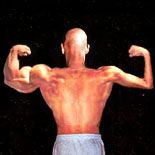 That night I had to sleep over at her house, my mean sitter Theresa told me that the clanking sounds outside were those of the Night Deliveryman, a shadowy figure who scaled tenement walls in search of children. This explanation was corroborated by her husband Raymond, whose principal function was to torment me with flipped eyelids. What they lacked in imagination I more than made up for. To me the Night Deliveryman had a giant head, like an upturned wheelbarrow, and small silvery slit-eyes, and it walked eight feet tall on eight black spindly legs. Its flesh was leathery and dry, and it clung to its skull in tatters. Other details were more intimate: a whisper close to my ear, “Hey…” repeated endlessly, “hey…” and I remember trying to drown it out with my pillow as I lay on the hard parquet floor in the pitch-dark hallway. “… hey…” Still, my kid logic said it was better to be in the hallway than in their room: the Night Deliveryman would have to clamber up through their window before it could get to me.
That night I had to sleep over at her house, my mean sitter Theresa told me that the clanking sounds outside were those of the Night Deliveryman, a shadowy figure who scaled tenement walls in search of children. This explanation was corroborated by her husband Raymond, whose principal function was to torment me with flipped eyelids. What they lacked in imagination I more than made up for. To me the Night Deliveryman had a giant head, like an upturned wheelbarrow, and small silvery slit-eyes, and it walked eight feet tall on eight black spindly legs. Its flesh was leathery and dry, and it clung to its skull in tatters. Other details were more intimate: a whisper close to my ear, “Hey…” repeated endlessly, “hey…” and I remember trying to drown it out with my pillow as I lay on the hard parquet floor in the pitch-dark hallway. “… hey…” Still, my kid logic said it was better to be in the hallway than in their room: the Night Deliveryman would have to clamber up through their window before it could get to me.
Now when I think of scary things at night my first thought is: Mid-thirties. You’re in them. So these scary things figure how, again? But still I’ll think of them, and devising the scariest apparition is a kind of delicious torment. Oh, I went through my air-shark phase, and the creeping black web found favor for a time, and also the betentacled glowing tongue – nasty business, that. These days my demon of choice is once again a spindly thing – which is what reminded me of the Night Deliveryman – and I do so fuss over it. I have to get every horrible detail right for it to have the desired effect, which is to make the back of my neck feel vulnerable when I’m sitting here typing this very sentence!
Whew! That was close.
So what about the moment of truth then? Once this thing of yours is good and summoned, the ball’s in your court. What to do? Well first of all there are several things you don’t want to do. You don’t want to check behind you, because acknowledging the possibility of peril actually draws it. One glance over your shoulder is akin to inviting a vampire in for tea.
Running and hiding and screaming and pleading only feeds the thing you fear, which is why scary movies make you feel helpless: you’re sympathizing with a character who is doing the worst thing possible, and you have no say in the matter. You wuss out by looking for the boom in the shot or the reflection of the camera guy in the reflection of the alien’s single black eye. But it’s a different story when the lights go out that night, isn’t it?
There is an answer though, and you shouldn’t be too hard on yourself for failing to realize this on your own. It’s hardly obvious, and certainly not something that would play well in those awful movies you so love. The answer is to drop your pants and shake what your momma gave you, and make the most ridiculous face you can muster. Still with me? Then, when the monster is trying to figure out how to handle this idiot, you go hog wild on the apparition’s ass, plunging your arms like lances deep into its body, and make with the lamprey lips and suck out its salty viscera. The answer, my friend, is bloodlust – you have to find it within yourself. And if you’re not into viscera then you’d better convince yourself otherwise before it’s too late (have you looked behind you lately?).
Maybe that night hasn’t come yet, but you have to be ready. You have to know its in you when the sun is up too, when you’re wearing your stupid lemming khaki pants and driving your stupid lemming SUV, you have to know that you’re lethal, and ready to bathe in entrails. A part of you must fear yourself, because every second of every day you are walking death – worse even than your own darkest fears. Potentially.
And otherwise a pretty good conversationalist.
 My iPod’s wee foam earbuds don’t fit perfectly: the left bud is snug, but the right is a touch too tight. And this isn’t because the appliance is imperfect. My earphones are symmetrical, but I am not. I remember a time when this realization would have been cause for profound concern, because symmetry was just about all I had to rely on when I was a child–it seemed dependable as few things were. But time has given me an appreciation for the misaligned, the uneven, the drifted.
My iPod’s wee foam earbuds don’t fit perfectly: the left bud is snug, but the right is a touch too tight. And this isn’t because the appliance is imperfect. My earphones are symmetrical, but I am not. I remember a time when this realization would have been cause for profound concern, because symmetry was just about all I had to rely on when I was a child–it seemed dependable as few things were. But time has given me an appreciation for the misaligned, the uneven, the drifted.